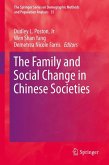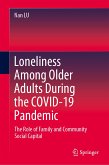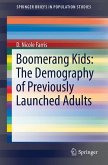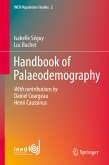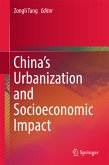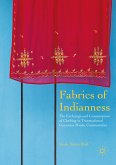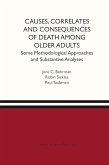Family Issues on Marriage, Divorce, and Older Adults in Japan (eBook, PDF)
With Special Attention to Regional Variations


Alle Infos zum eBook verschenken

Family Issues on Marriage, Divorce, and Older Adults in Japan (eBook, PDF)
With Special Attention to Regional Variations
- Format: PDF
- Merkliste
- Auf die Merkliste
- Bewerten Bewerten
- Teilen
- Produkt teilen
- Produkterinnerung
- Produkterinnerung

Hier können Sie sich einloggen

Bitte loggen Sie sich zunächst in Ihr Kundenkonto ein oder registrieren Sie sich bei bücher.de, um das eBook-Abo tolino select nutzen zu können.
This book provides insightful sociological analyses of Japanese demography and families, paying attention not only to national average data, but also to regional variations and community level analyses. In analyzing Japanese family issues such as demographic changes, courtship and marriage, international marriage, divorce, late-life divorce, and the elderly living alone, this book emphasizes the significance of two theoretical frameworks: the dual structure and regional variations of the community network in Japan.
By emphasizing the extensive cultural diversity from one region to another,…mehr
- Geräte: PC
- ohne Kopierschutz
- eBook Hilfe
- Größe: 4.72MB
![The Family and Social Change in Chinese Societies (eBook, PDF) The Family and Social Change in Chinese Societies (eBook, PDF)]() The Family and Social Change in Chinese Societies (eBook, PDF)73,95 €
The Family and Social Change in Chinese Societies (eBook, PDF)73,95 €![Loneliness Among Older Adults During the COVID-19 Pandemic (eBook, PDF) Loneliness Among Older Adults During the COVID-19 Pandemic (eBook, PDF)]() Nan LuLoneliness Among Older Adults During the COVID-19 Pandemic (eBook, PDF)73,95 €
Nan LuLoneliness Among Older Adults During the COVID-19 Pandemic (eBook, PDF)73,95 €![Boomerang Kids: The Demography of Previously Launched Adults (eBook, PDF) Boomerang Kids: The Demography of Previously Launched Adults (eBook, PDF)]() D. Nicole FarrisBoomerang Kids: The Demography of Previously Launched Adults (eBook, PDF)48,95 €
D. Nicole FarrisBoomerang Kids: The Demography of Previously Launched Adults (eBook, PDF)48,95 €![Handbook of Palaeodemography (eBook, PDF) Handbook of Palaeodemography (eBook, PDF)]() Isabelle SéguyHandbook of Palaeodemography (eBook, PDF)73,95 €
Isabelle SéguyHandbook of Palaeodemography (eBook, PDF)73,95 €![China's Urbanization and Socioeconomic Impact (eBook, PDF) China's Urbanization and Socioeconomic Impact (eBook, PDF)]() China's Urbanization and Socioeconomic Impact (eBook, PDF)40,95 €
China's Urbanization and Socioeconomic Impact (eBook, PDF)40,95 €![Fabrics of Indianness (eBook, PDF) Fabrics of Indianness (eBook, PDF)]() Sinah Theres KloßFabrics of Indianness (eBook, PDF)89,95 €
Sinah Theres KloßFabrics of Indianness (eBook, PDF)89,95 €![Causes, Correlates and Consequences of Death Among Older Adults (eBook, PDF) Causes, Correlates and Consequences of Death Among Older Adults (eBook, PDF)]() Jere R. BehrmanCauses, Correlates and Consequences of Death Among Older Adults (eBook, PDF)73,95 €
Jere R. BehrmanCauses, Correlates and Consequences of Death Among Older Adults (eBook, PDF)73,95 €-
-
-
By emphasizing the extensive cultural diversity from one region to another, this book represents a paradigm shift from former studies of Japanese families, which relied mostly on national average data. The method of analysis adopted in the study is qualitative, with a historical perspective. The book is thus an invitation to more in-depth, qualitative dialogue in the field of family sociology in Japan.
This book will be of great interest not only to Asian scholars, but also to other specialists in comparative family studies around the world.
Dieser Download kann aus rechtlichen Gründen nur mit Rechnungsadresse in A, B, BG, CY, CZ, D, DK, EW, E, FIN, F, GR, HR, H, IRL, I, LT, L, LR, M, NL, PL, P, R, S, SLO, SK ausgeliefert werden.
- Produktdetails
- Verlag: Springer Nature Singapore
- Seitenzahl: 184
- Erscheinungstermin: 14. Oktober 2014
- Englisch
- ISBN-13: 9789812871855
- Artikelnr.: 43787099
- Verlag: Springer Nature Singapore
- Seitenzahl: 184
- Erscheinungstermin: 14. Oktober 2014
- Englisch
- ISBN-13: 9789812871855
- Artikelnr.: 43787099
- Herstellerkennzeichnung Die Herstellerinformationen sind derzeit nicht verfügbar.

